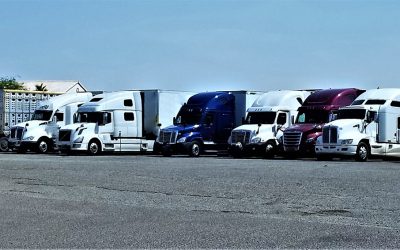Revolutionizing the Trucking Business With IT Softwares
Introduction: The trucking industry serves as the backbone of global trade, facilitating the movement of goods across vast distances. In recent years, the advent of information technology (IT) software has revolutionized the way trucking businesses operate, streamlining processes, enhancing efficiency, and driving growth. From fleet management to logistics optimization, IT software has become an indispensable tool for trucking companies looking to stay competitive in an increasingly digital world.
Fleet Management Software: One of the key areas where IT software has made a significant impact is fleet management. Gone are the days of manually tracking vehicles, routes, and maintenance schedules. Modern fleet management software provides comprehensive solutions to monitor and manage fleets efficiently. These software applications offer real-time tracking of vehicles, enabling companies to optimize route planning, reduce fuel consumption, and improve overall fleet performance. By automating tasks like vehicle maintenance scheduling and driver assignments, fleet management software helps trucking businesses increase productivity and minimize downtime.
Logistics Optimization: Efficient logistics management is crucial for the success of any trucking company. IT software has greatly enhanced logistics optimization by offering sophisticated tools to streamline operations. Advanced software applications can analyze vast amounts of data, including traffic patterns, weather conditions, and delivery schedules, to identify the most efficient routes and reduce delivery times. This optimization not only improves customer satisfaction but also reduces fuel costs and minimizes wear and tear on vehicles. Moreover, software solutions can integrate with other stakeholders in the supply chain, such as warehouses and distribution centers, to ensure seamless coordination and enhance overall efficiency.
Electronic Logging Devices (ELDs): The implementation of electronic logging devices (ELDs) has been a significant development in the trucking industry. ELDs are IT software solutions that replace traditional paper-based logbooks, enabling truck drivers to accurately record their hours of service (HOS) electronically. These devices automatically track driving time, rest periods, and other compliance requirements, ensuring adherence to government regulations. ELDs not only improve compliance but also enhance safety by preventing drivers from exceeding their maximum driving hours. By reducing paperwork and manual record-keeping, ELDs simplify administrative tasks and enable drivers to focus more on their primary responsibilities.
Freight Management Systems: Freight management systems have revolutionized the way shipments are managed and tracked. These software applications enable trucking companies to efficiently manage the entire freight lifecycle, from order placement to delivery confirmation. With freight management systems, businesses can easily track shipments, generate invoices, and monitor inventory levels. These systems also provide visibility into shipment status, enabling proactive communication with customers and minimizing delays. Additionally, freight management software can integrate with other platforms, such as e-commerce websites and enterprise resource planning (ERP) systems, further streamlining operations and improving customer satisfaction.
Data Analytics and Business Intelligence: The power of IT software in the trucking industry extends beyond operational efficiency. Trucking companies can leverage data analytics and business intelligence tools to gain valuable insights into their operations. By analyzing data on fuel consumption, maintenance costs, driver performance, and customer preferences, companies can identify trends, optimize their operations, and make informed decisions. For instance, data analytics can reveal patterns in delivery routes that could lead to more efficient planning or highlight opportunities for cost savings. Business intelligence tools enable trucking companies to identify areas for improvement, enhance profitability, and stay ahead of the competition.
The trucking industry is undergoing a digital transformation, with IT software playing a vital role in driving efficiency and growth. From fleet management to logistics optimization, electronic logging devices to freight management systems, and data analytics to business intelligence, the integration of IT software has revolutionized how trucking businesses operate. As technology continues to evolve, embracing innovative IT solutions will be crucial for trucking companies to remain competitive, meet customer demands, and navigate the complexities of the modern transportation landscape.



